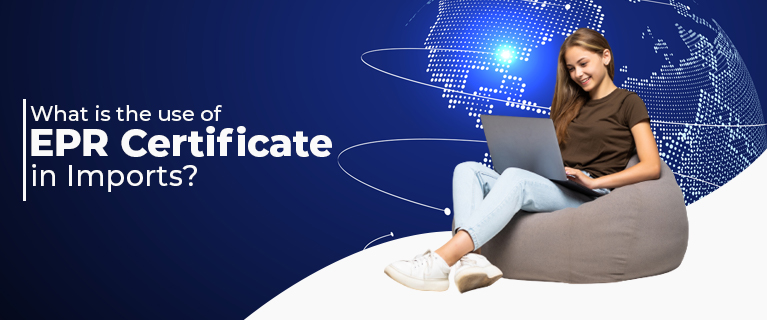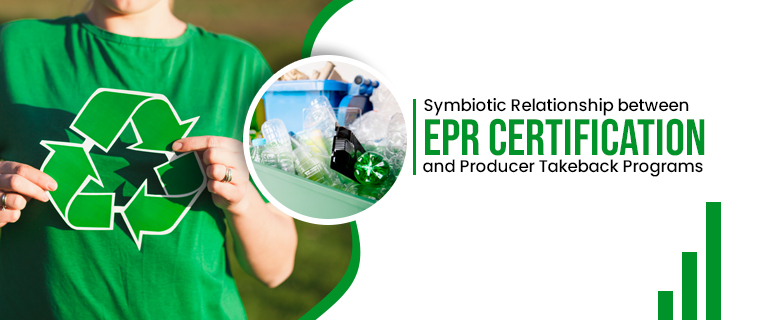What is the use of EPR Certificate in Imports?
In the ever-evolving landscape of international trade, adherence to regulatory frameworks is paramount for seamless transactions and sustainable business practices. One such essential document in the importation process is the Extended Producer Responsibility (EPR) Certificate. This certificate plays a crucial role in ensuring that imported goods comply with environmental regulations, contributing to responsible and eco-friendly trade practices.
What is an EPR Certificate?
Extended Producer Responsibility is a concept that places the onus on manufacturers and importers to manage the environmental impact of their products throughout their entire life cycle. The EPR Certificate, therefore, serves as evidence that a particular importer is fulfilling their responsibility in an environmentally conscious manner. It signifies compliance with environmental norms and regulations set by the importing country.
Read also this-: Demystifying the EPR Certificate FormatEnvironmental Considerations in International Trade
The global awareness of environmental issues has led countries to tighten regulations on the importation of goods. Many nations now require importers to demonstrate their commitment to environmental sustainability. The EPR Certificate is a tangible manifestation of this commitment, showcasing that the importer is taking steps to minimize the environmental footprint associated with their products.
Key Components of EPR Certificates:
EPR Certificates typically include details such as the importer's environmental management practices, waste reduction strategies, and plans for the proper disposal or recycling of products. These certificates may also outline the measures taken to educate consumers about the eco-friendly aspects of the imported goods, contributing to a more environmentally conscious consumer base.
Regulatory Compliance and EPR Certificates:
For importers, navigating the complex web of international trade regulations is a constant challenge. The EPR Certificate acts as a navigational tool in this landscape, ensuring compliance with environmental laws and regulations specific to the importing country. Importantly, failure to obtain or adhere to the conditions of an EPR Certificate can result in penalties, shipment delays, or even the rejection of goods at the border.
Advantages for Importers
Beyond mere regulatory compliance, the EPR Certificate offers tangible benefits for importers. It enhances the reputation of businesses as environmentally responsible entities, which can be a significant selling point in today's environmentally conscious consumer market. Moreover, the implementation of sustainable practices can lead to cost savings through efficient resource utilization and waste reduction.
Challenges and Opportunities:
While obtaining an EPR Certificate can be a prerequisite for entry into certain markets, it also presents challenges for importers. Developing and implementing environmentally sustainable practices may require initial investments in technology, training, and infrastructure. However, these challenges also create opportunities for innovation and differentiation in the marketplace. Importers can leverage their commitment to sustainability as a competitive advantage, attracting environmentally conscious consumers and partners.
International Collaboration and Standardization:
Given the global nature of trade, efforts are underway to standardize EPR requirements across borders. International collaboration in this regard aims to streamline the certification process, making it more accessible and manageable for businesses engaged in cross-border trade. The harmonization of EPR standards can contribute to a more sustainable and efficient global supply chain.
Read also this-: Revolutionizing E-Waste Management Through EPR CertificationThe Future of EPR Certificates in Importation:
As the world grapples with environmental challenges, the importance of EPR Certificates is expected to grow. Importers will likely face increasing scrutiny regarding their environmental practices, and the demand for transparent and responsible trade will continue to rise. The future holds opportunities for businesses that proactively embrace sustainable practices, ensuring the long-term viability of their operations in a world that values environmental responsibility.
Conclusion:
In conclusion, the Extended Producer Responsibility (EPR) Certificate has become an integral part of the importation process, reflecting the global shift towards environmentally conscious trade practices. Beyond mere regulatory compliance, EPR Certificates offer importers a chance to distinguish themselves in the market, attract environmentally conscious consumers, and contribute to a more sustainable global supply chain. As international collaboration continues, the standardization of EPR requirements will likely simplify the certification process, further encouraging businesses to adopt environmentally responsible practices. The future of importation will undoubtedly be shaped by the commitment of businesses to sustainable and eco-friendly trade.




Comments
Post a Comment